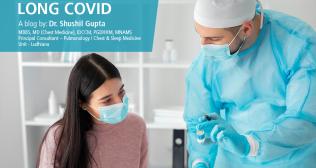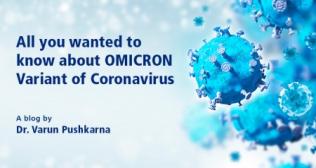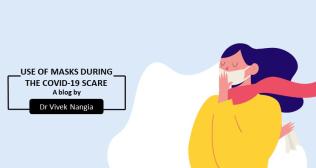
10 Essential Facts About Ventilator
Mechanical ventilator ? How does it work?
To answer this question we need to have some basic understanding of the process of respiration. During respiration we breathe in atmospheric air by a process known as inspiration. It is an active process, requires activities of diaphragm (a large muscle situated between chest and abdomen) and muscles of chest wall. Once the air reaches the lungs it participates in the exchange of gases dependent on intact alveoli (small units of lung) – the body takes up oxygen and carbon di-oxide (the bad air) is diffused out. The remaining air (and carbon di-oxide) is breathed out, a process known as exhalation. The complete process of inhalation and exhalation is also known as ventilation. For normal ventilation we need to have intact air passage (airway) and an intact pump (diaphragm and chest wall muscles).
Ventilator is basically a pump, which pushes air in the chest cavity and lungs. It also has a blender inbuilt which produces a mixture of supplemental oxygen and air, thus delivering measured percentage (21-100%) of oxygen to the patient (room air contains 21% oxygen).
In some disease processes, the respiratory pump fails because of inherent muscle weakness (e.g. Myasthenia gravis or GB Syndrome) or excessive workload (e.g. severe form of asthma where patient fails to empty the lung completely) or low supply of energy to the pump (e.g. in state of circulatory shock). Mechanical ventilator helps in unloading failing respiratory pump and let the patient survive till recovery from particular disease.
Who needs a ventilator?
1. Patient who is not breathing e.g. after cardiac or respiratory arrest (provided there is chance of recovery)
2. Patient whose chest wall muscles or diaphragm are weak because weak nerves (e.g. GB Syndrome or Polio) or inherent weakness of muscles (e.g. muscular dystrophy).
3. Patients who are facing difficulty in exhaling air because of spasms in the air pipes leading to retention of carbon di-oxide (e.g. severe asthma attack or chronic bronchitis).
4. In patients with compromised air passage (e.g. unconscious patient, during surgery or mechanical obstruction of airpipe) an artificial airway is placed (Endotracheal Tube) which is narrower then the natural air passage, increasing the work of breathing. Mechanical ventilator again helps in decreasing this excess workload.
5. In patients with lung flooded with water (pulmonary edema) or secretion (e.g. Pneumonia) with inability to maintain adequate level of oxygenation, mechanical ventilator can help in keeping the lung inflated by positive pressure. Ventilator can also deliver high concentration of oxygen.
How a positive pressure breath is delivered?
Positive pressure ventilation can be delivered either via an artificial air passage (Endotracheal tube or Tracheostomy) called invasive ventilation or via a tight fitting facemask called non-invasive ventilation (NIV). While NIV is more comforting to the patient, it cannot be used in an unconscious patient or in patients who require high-end support.
Can ventilator improve lung function?
No. Mechanical ventilator can only provide support, unload respiratory muscle, keep the lung inflated and provide oxygen. Lung function improves only with time and treatment of underlying disease.
Who can deliver mechanical ventilation?
Delivering mechanical ventilation requires high level of skill, constant monitoring of patients lung function (and change in level of ventilation delivered), monitoring of patient?s circulatory status (remember both heart and lungs are in the same chest cavity), monitoring of patient-ventilator interaction and a constant look out for any complication. Short term ventilation can be delivered by Anesthesiologists in the Operation Theater, but long-term ventilation can be delivered only by a highly skilled set of physicians called Intensivists, who also take care of other acute needs of a sick patient (most patients on ventilators also need support of other organs). In some countries (like in United States of America), respiratory therapists assist intensivists in delivery of mechanical ventilation.
Can mechanical ventilation be delivered in the general wards?
No. Mechanical ventilation can be delivered only in the intensive care unit, under supervision of a skilled intensivist. It needs highly skilled nursing, constant monitoring with sophisticated monitors and often support to other failing organs.
Is mechanical ventilation completely safe?
In skilled hand mechanical ventilation is quite safe. But positive pressure breath may complicate an already compromised patient, because of high level of pressure on a diseased lung (pneumothorax or air leak), because of the effect on heart (circulatory disturbances especially in a patient already in shock), because of breach in natural airway (higher risk of lung infection) or because of non-ambulatory status (pressure sore or deep vein thrombosis). These complications are far more common in extremely sick patients. They can at least partially be prevented or detected and treated early by constant monitoring.
When can a patient be taken out of ventilator?
Mechanical ventilation support cannot be withdrawn abruptly (like a baby cannot be expected to start on solid food abruptly). The clinical condition (reason for mechanical ventilation) must be significantly improved and patient must be stable before taking a decision to withdraw mechanical ventilation. Patient is gradually taken out of the support by a process called weaning which may take few hours to many days.
Who should not be ventilated?
Mechanical ventilation should not be started on a patient who is having an incurable disease like terminal cancer or end stage organ failure. Remember ventilator can only provide support to the patient not cure his or her illness and patient?s suffering should not prolonged by unnecessary support.
Can ventilator keep a dead patient alive?
No. Ventilator is just a mechanical support for the process of ventilation; it does not even help in gas exchange that depends on functioning lung and circulation. Ventilator has no effect on maintaining functions of heart or any other organs of the body. Moreover body becomes stiff few hours after death called rigor mortis and delivering mechanical breath in a patient on rigor mortis is extremely difficult.
Ventilator support plays a crucial role in aiding patients with compromised respiratory function. Understanding the function of ventilators and their various uses is essential in providing effective care, especially in critical healthcare settings like Fortis Healthcare. With Fortis Healthcare's commitment to excellence, patients can trust in the expertise and resources available for optimal ventilator support and overall medical care.
Popular Searches :
Hospitals: Cancer Hospital in Delhi | Best Heart Hospital in Delhi | Hospital in Amritsar | Hospital in Ludhiana | Hospitals in Mohali | Hospital in Faridabad | Hospitals in Gurgaon | Best Hospital in Jaipur | Hospitals in Greater Noida | Hospitals in Noida | Best Kidney Hospital in Kolkata | Best Hospital in Kolkata | Hospitals in Rajajinagar Bangalore | Hospitals in Richmond Road Bangalore | Hospitals in Nagarbhavi Bangalore | Hospital in Kalyan West | Hospitals in Mulund | Best Hospital in India | | Cardiology Hospital in India | Best Cancer Hospital in India | Best Cardiology Hospital in India | Best Oncology Hospital In India | Best Cancer Hospital in Delhi | Best Liver Transplant Hospital in India
Doctors: Dr. Rana Patir | Dr. Rajesh Benny | Dr. Rahul Bhargava | Dr. Jayant Arora | Dr. Anoop Misra | Dr. Manu Tiwari | Dr. Praveer Agarwal | Dr. Arup Ratan Dutta | Dr. Meenakshi Ahuja | Dr. Anoop Jhurani | Dr. Shivaji Basu | Dr. Subhash Jangid | Dr. Atul Mathur | Dr. Gurinder Bedi | Dr. Monika Wadhawan | Dr. Debasis Datta | Dr. Shrinivas Narayan | Dr. Praveen Gupta | Dr. Nitin Jha | Dr. Raghu Nagaraj | Dr. Ashok Seth | Dr. Sandeep Vaishya | Dr. Atul Mishra | Dr. Z S Meharwal | Dr. Ajay Bhalla | Dr. Atul Kumar Mittal | Dr. Arvind Kumar Khurana | Dr. Narayan Hulse | Dr. Samir Parikh | Dr. Amit Javed | Dr. Narayan Banerjee | Dr. Bimlesh Dhar Pandey | Dr. Arghya Chattopadhyay | Dr. G.R. Vijay Kumar | Dr Ashok Gupta | Dr. Gourdas Choudhuri | Dr. Sushrut Singh | Dr. N.C. Krishnamani | Dr. Atampreet Singh | Dr. Vivek Jawali | Dr. Sanjeev Gulati | Dr. Amite Pankaj Aggarwal | Dr. Ajay Kaul | Dr. Sunita Varma | Dr. Manoj Kumar Goel | Dr. R Muralidharan | Dr. Sushmita Roychowdhury | Dr. T.S. MAHANT | Dr. UDIPTA RAY | Dr. Aparna Jaswal | Dr. Ravul Jindal | Dr. Savyasachi Saxena | Dr. Ajay Kumar Kriplani | Dr. Nitesh Rohatgi | Dr. Anupam Jindal |
Specialties: Heart Lung Transplant | Orthopedic | Cardiology Interventional | Obstetrics & Gynaecology | Onco Radiation | Neurosurgery | Interventional Cardiology | Gastroenterologist in Jaipur | Neuro Physician | Gynecologist in Kolkata | Best Neurologist in India | Liver Transfer |


















